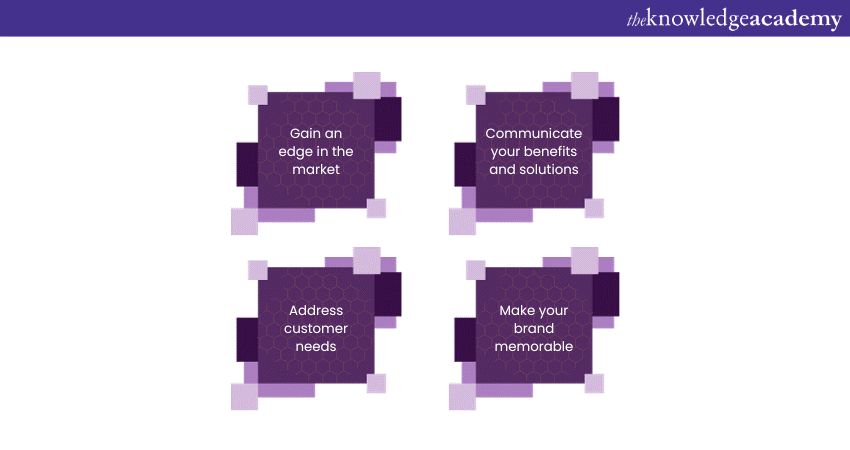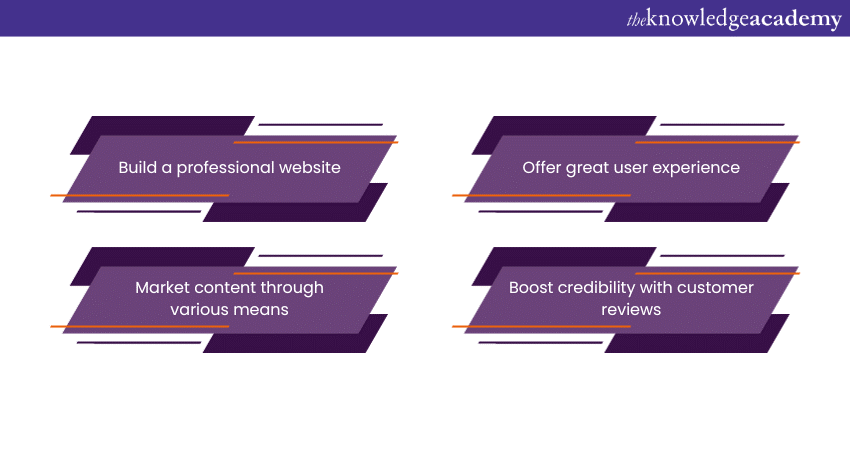We may not have the course you’re looking for. If you enquire or give us a call on +91-181-5047001 and speak to our training experts, we may still be able to help with your training requirements.
Training Outcomes Within Your Budget!
We ensure quality, budget-alignment, and timely delivery by our expert instructors.

Mastering effective Marketing Strategies for Small Businesses is essential for achieving prominence amid competition. Limited resources demand precision and innovation. From defining target audiences to embracing digital tools and local collaborations, the following insights offer actionable steps for businesses to enhance visibility, engage customers, and thrive in their respective markets. This blog provides Marketing Strategies for Small Businesses, including digital presence, SEO optimisation, content creation, and social media use, to empower them effectively.
Table of Contents
1) Marketing for Small Businesses
2) Marketing Strategies for Small Businesses
a) Know your customers
b) Highlight your value proposition
c) Maintain concentration on specific goals and objectives
d) Understand the impact of your current customer base
e) Utilise cold email marketing
f) Promote your business online
g) Establish connections with local businesses
h) Create a brand
I) Develop a website
j) Use the power of SEO
3) Conclusion
Marketing for Small Businesses
Marketing for Small Businesses is a dynamic and essential concept that revolves around promoting products or services to a targeted audience with limited resources. Unlike larger enterprises, small businesses often face budget constraints, making it crucial to adopt strategic and cost-effective approaches.
Now, Small Business Marketing aims to increase brand visibility, attract new customers, and foster loyalty among existing ones. One key aspect is understanding the target audience intimately. Small businesses must identify the demographics, preferences, and behaviours of their potential customers to tailor marketing efforts effectively.
This targeted approach ensures that every marketing dollar is spent efficiently, maximising the impact on the desired consumer base. Online presence is paramount. Small businesses leverage websites, social media, and email marketing to connect with their audience.
Furthermore, Content Marketing plays a pivotal role, allowing businesses to showcase expertise, build credibility, and engage customers in a meaningful way. Strategic promotions, referral programs, and community engagement are also vital components.
Moreover, creating a positive customer experience and building relationships are often as critical as the product or service itself. Adaptability is a key theme in small business marketing, as staying current with industry trends and swiftly adjusting strategies to meet evolving consumer needs can make the difference between success and stagnation. In essence, Marketing for Small Businesses is a dynamic blend of strategy, creativity, and adaptability tailored to maximise impact within limited resources.
Marketing Strategies for Small Businesses
Here is a list highlighting and describing the various Marketing Strategies for Small Business:
1) Know your customers
Knowing your customers is paramount for small businesses as it forms the bedrock of successful marketing and sustainable growth. Understanding the demographics, preferences, and behaviours of your target audience enables tailored marketing strategies, ensuring your efforts resonate with the right people.
This personalised approach fosters stronger connections, builds customer loyalty, and enhances the overall customer experience. By knowing your customers intimately, small businesses can allocate resources more efficiently, offer products or services that genuinely meet customer needs, and adapt swiftly to changing market demands. Customer knowledge is the key to forging lasting relationships and thriving in a competitive business landscape.
2) Highlight your value proposition

Highlighting your value proposition is essential for standing out in a competitive market. It succinctly communicates the unique benefits and solutions your business offers to customers, showcasing why they should choose you over competitors.
Furthermore, a strong value proposition clarifies the distinct advantages and addresses customer needs, making your brand memorable. This clear messaging not only attracts new customers but also fosters trust and loyalty among existing ones.
By effectively highlighting your value proposition, you differentiate your business, create a compelling narrative, and establish a solid foundation for customer acquisition and retention.
3) Maintain concentration on specific goals and objectives
Maintaining concentration on specific goals and objectives is pivotal for small businesses navigating limited resources. Focused goals provide a clear roadmap, helping businesses allocate resources efficiently and avoid distractions.
Additionally, concentration ensures that every effort aligns with overarching objectives, fostering a cohesive and purposeful strategy. This targeted approach enhances productivity, facilitates informed decision-making, and accelerates progress toward milestones.
In the dynamic small business environment, staying concentrated on specific goals cultivates resilience and adaptability, allowing entrepreneurs to navigate challenges while steadily advancing toward long-term success.
4) Understand the impact of your current customer base
Understanding the impact of your current customer base is a cornerstone for small businesses. Analysing customer demographics, behaviours, and feedback provides valuable insights into preferences and satisfaction levels.
Recognising the most profitable segments allows for targeted marketing and personalised engagement, maximising customer retention. Satisfied customers become brand advocates, contributing to positive word-of-mouth and organic growth.
Additionally, understanding customer needs enables agile adaptation, ensuring products or services align with market demands. By comprehending the impact of their current customer base, small businesses can refine strategies, enhance customer experience, and lay a robust foundation for sustained success in a competitive landscape.
5) Utilise cold email marketing
Utilising cold email marketing effectively can be a powerful tool for small businesses. Crafted thoughtfully, these emails can initiate valuable connections with potential clients or partners. Personalisation and relevance are key to addressing recipients' specific needs.
Furthermore, a compelling subject line and concise content grab attention. Follow-ups are crucial for building rapport. Cold email campaigns, when targeted and respectful, can generate leads, drive engagement, and expand a business's network.
Regularly analysing metrics and adapting strategies ensures the continued success of this direct outreach approach in expanding the reach and fostering meaningful business relationships.
Reach out to existing and prospective customers by signing up for our Email Marketing Course now!
6) Promote your business online

Promoting your small business online is paramount for visibility and growth. Start with a professional website optimised for search engines, offering a seamless user experience. Leverage social media platforms, tailoring content to your audience. Engage in content marketing through blogs, videos, or infographics, showcasing expertise. Utilise email marketing for targeted communication and invest in online advertising, such as PPC campaigns. Foster positive customer reviews and ratings, enhancing credibility. Actively participate in online communities related to your industry. Consistency across platforms and adaptability to emerging trends are key in establishing and expanding your online presence, driving customer acquisition and brand recognition.
7) Establish connections with local businesses
Establishing connections with local businesses is pivotal for small enterprises, fostering a supportive community and expanding outreach. Begin by attending local networking events and joining business associations, allowing for face-to-face interactions.
Additionally, collaborate on joint promotions or events, leveraging each other's customer bases. Engage with local businesses on social media, sharing and promoting each other's content. Offer reciprocal discounts or cross-promotional opportunities to incentivise collaboration.
Furthermore, actively participate in community initiatives, demonstrating a commitment to the local area. By building these connections, small businesses can create a network that not only enhances visibility but also opens doors to valuable resources, partnerships, and a sense of community support.
8) Create a brand
Creating a strong brand is essential for small businesses to stand out in a competitive market. Begin by defining your unique value proposition and core values. Design a memorable and cohesive brand identity, including a distinctive logo and consistent visual elements. Craft a compelling brand story that resonates with your target audience. Establish an online presence through a professional website and active social media engagement. Consistently deliver quality products or services to build a positive reputation. Encourage customer reviews and testimonials to enhance credibility. By consistently reinforcing your brand message and values, small businesses can cultivate a recognisable and trustworthy brand that attracts and retains loyal customers.
Develop an impactful brand strategy by signing up for our Business Branding Masterclass now!
9) Develop a website
Developing a website is pivotal for small businesses, serving as a virtual storefront and a powerful marketing tool. It provides a professional and easily accessible platform for potential customers to learn about products or services.
Moreover, a well-designed website enhances credibility, instilling trust in the brand. It expands market reach beyond local boundaries, tapping into a global audience. With e-commerce functionality, businesses can facilitate online transactions, increasing revenue streams.
Additionally, a website serves as a hub for digital marketing efforts, supporting activities such as content marketing, SEO, and social media engagement. It is vital to note that a website is a fundamental asset for small businesses to establish and grow their online presence.
Create stunning HTML websites by signing up for our Website Design Course now!
10) Use the power of SEO
Leveraging the power of SEO (Search Engine Optimisation) is critical for small businesses to enhance online visibility and competitiveness. SEO optimises a website's structure and content to rank higher in search engine results, making it more discoverable by potential customers. By targeting relevant keywords, small businesses can attract organic traffic and reach a precisely defined audience. This cost-effective strategy levels the playing field, allowing small enterprises to compete with larger counterparts. Effective SEO not only boosts website visibility but also establishes credibility, driving long-term success by consistently attracting and retaining a steady flow of qualified leads and customers.
11) Research in-depth on keyword opportunities
In-depth research on keyword opportunities is invaluable for businesses seeking online visibility and audience engagement. By understanding the phrases and terms potential customers use to search for products or services, businesses can optimise their content to align with these queries.
This research unveils insights into consumer behaviour, competition, and emerging trends, guiding the creation of relevant and targeted content. Utilising the right keywords enhances a website's search engine ranking, driving organic traffic and attracting a qualified audience.
Moreover, it's a strategic investment that not only improves online discoverability but also ensures that a business is effectively meeting the needs and expectations of its target market.
12) Optimise your website for use on mobile devices
Optimising a website for mobile devices is paramount in ensuring a seamless user experience and expanding reach. With the increasing prevalence of smartphones, a mobile-friendly site caters to users on the go, enhancing accessibility and engagement.
Google prioritises mobile-friendly websites in search results, positively impacting search engine rankings. A responsive design not only improves user satisfaction but also reduces bounce rates, translating to higher conversion rates.
As mobile usage continues to surge, ensuring your website is optimised for various devices becomes a strategic necessity, allowing businesses to stay competitive and effectively connect with a diverse and mobile-centric audience.
13) Write SEO-optimised blog posts
Writing SEO-optimised blog posts is crucial for online visibility and attracting organic traffic. Start by researching relevant keywords and strategically placing them in titles, headings, and throughout the content.
Additionally, craft compelling and informative content that addresses user queries and adds value. Utilise meta tags and descriptions to provide concise summaries for search engines. Maintain a reader-friendly structure with clear headings and subheadings.
Moreover, incorporate internal and external links to boost credibility and navigation. Regularly update content to reflect industry trends. By focusing on both user experience and search engine algorithms, SEO-optimised blog posts increase the likelihood of higher rankings, driving sustained organic traffic to your site.
14) Do trial and error with your graphic and video content
Engaging in trial and error with graphic and video content is essential for refining your visual marketing strategy. Experiment with various visual elements, styles, and formats to identify what resonates best with your audience.
Analyse metrics such as engagement, shares, and conversion rates to assess performance. Test different tones, messaging, and design elements to discover what elicits the desired response. Embrace feedback and adapt accordingly, honing in on the most effective visual content for your brand. This iterative process not only enhances content quality but also ensures a dynamic and evolving approach that captivates your audience and aligns with your brand objectives.
15) Launch your business pages on Facebook and Google
Launching business pages on Facebook and Google is a strategic move for small businesses, amplifying online presence and customer reach. Facebook provides a platform to build a community, share updates, and engage with customers through comments and messages.
Google My Business enhances local visibility, showcasing essential information like location, hours, and reviews. Both platforms offer cost-effective advertising solutions, targeting specific demographics to maximise marketing efforts.
By establishing a strong presence on these widely used platforms, small businesses not only increase discoverability but also leverage powerful tools for customer interaction, feedback, and the potential for increased brand recognition and customer trust.
Conclusion
In conclusion, implementing effective marketing strategies for small businesses is pivotal for sustained success. By embracing targeted approaches, establishing a strong online presence, and fostering local connections, businesses can navigate the competitive landscape.
The key lies in adaptability and a commitment to optimising every facet of the marketing strategy for small business growth.
Develop new products with excellent Marketing Strategies by signing up for our Introduction to Marketing Training now!
Frequently Asked Questions
Upcoming Digital Marketing Resources Batches & Dates
Date
 Introduction to Marketing Training
Introduction to Marketing Training
Fri 10th Jan 2025
Fri 14th Mar 2025
Fri 9th May 2025
Fri 11th Jul 2025
Fri 12th Sep 2025
Fri 14th Nov 2025







 Top Rated Course
Top Rated Course



 If you wish to make any changes to your course, please
If you wish to make any changes to your course, please


